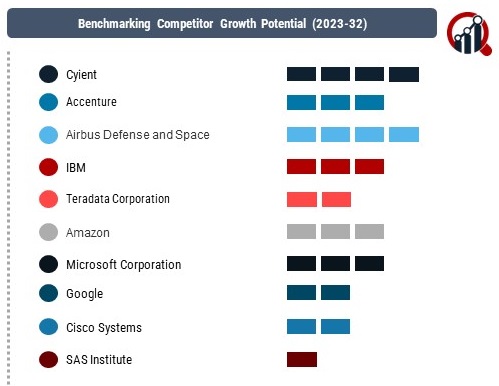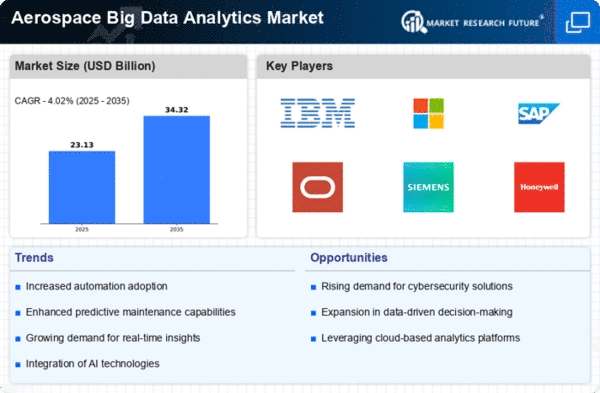Top Industry Leaders in the Aerospace Big Data Analytics Market

Key Players and Market Dynamics:
Cyient (India)
Accenture (Ireland)
Airbus Defense and Space (Munich)
IBM (U.S.)
Teradata Corporation (U.S.)
Amazon (U.S.)
Microsoft Corporation (U.S.)
Google (U.S.)
Cisco Systems (U.S.)
SAS Institute (U.S.)
SAP SE (Germany)
Strategies Adopted:
Companies operating in the Aerospace and Defense Big Data Analytics market are adopting multifaceted strategies to stay competitive. Integration of artificial intelligence and machine learning algorithms, coupled with real-time analytics, is a common trend. Lockheed Martin, for instance, has embraced a data-centric approach by investing in cutting-edge technologies that enable real-time data processing for quicker and more informed decision-making. Collaborations and partnerships are also prevalent, with IBM partnering with various defense agencies to implement advanced analytics solutions.
Factors for Market Share Analysis:
Several factors contribute to the market share dynamics in the Aerospace and Defense Big Data Analytics sector. The ability to provide end-to-end solutions, compliance with stringent security standards, scalability, and the integration of cloud-based analytics are pivotal. Lockheed Martin's leadership in developing comprehensive solutions, including both hardware and software components, positions it favorably. Market penetration strategies, global reach, and the depth of analytics capabilities also play a crucial role, with BAE Systems excelling in catering to diverse global defense markets.
New and Emerging Companies:
The landscape is not limited to industry giants, as new and emerging companies are making significant strides. Palantir Technologies, for example, has gained prominence for its data integration and analytics platforms, offering innovative solutions for defense and intelligence agencies. Another entrant, C3.ai, specializes in applying artificial intelligence to optimize business processes, providing predictive analytics for maintenance and supply chain management.
Industry News and Trends:
Recent industry news underscores the evolving nature of the Aerospace and Defense Big Data Analytics sector. The emphasis on developing resilient and secure data ecosystems is highlighted by Northrop Grumman's partnership with cybersecurity firms to fortify its analytics platforms. Additionally, the industry is witnessing a shift towards edge computing, enabling real-time data processing at the source, reducing latency, and enhancing mission-critical operations. The integration of data analytics with emerging technologies such as 5G and the Internet of Things (IoT) further shapes the industry's trajectory.
Current Company Investment Trends:
Investment trends in the Aerospace and Defense Big Data Analytics sector reflect a commitment to innovation and staying ahead of the technological curve. Key players are allocating substantial resources to research and development, focusing on refining analytics algorithms, improving data security, and exploring applications of emerging technologies. Notably, IBM's investments in quantum computing and cognitive analytics underscore a commitment to pushing the boundaries of what's possible in data analysis within the defense sector.
Overall Competitive Scenario:
The competitive scenario in the Aerospace and Defense Big Data Analytics market is marked by a blend of established players, innovative newcomers, and collaborations that redefine industry standards. As data continues to play a pivotal role in modern warfare and aerospace operations, companies are striving to differentiate themselves through comprehensive analytics solutions, real-time processing capabilities, and a commitment to cybersecurity. The industry's future hinges on its ability to adapt to emerging technologies, foster strategic partnerships, and address evolving security challenges, ensuring a resilient and competitive landscape for years to come.
Recent Development :
Lockheed Martin, for instance, has been at the forefront, integrating advanced analytics into its operations to optimize supply chain processes and improve overall performance. Northrop Grumman focuses on leveraging Big Data to enhance intelligence capabilities, providing governments with comprehensive situational awareness.












